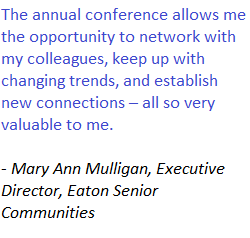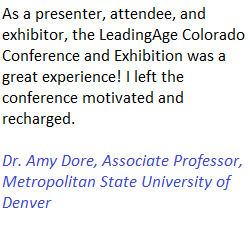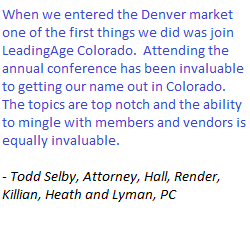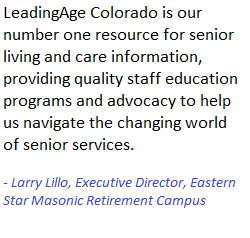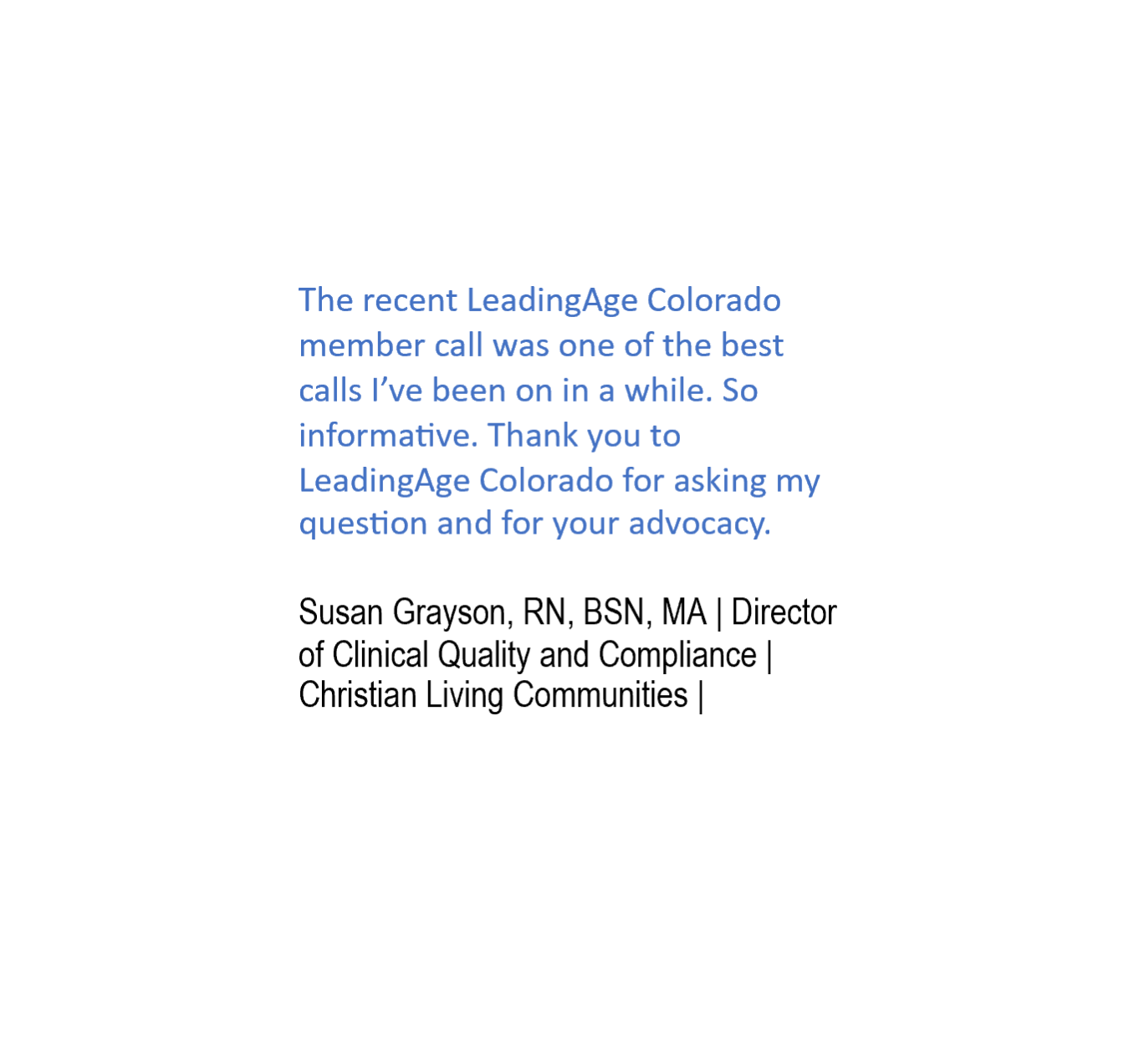Over the course of this eight-part weekly webinar series, aging services professionals are invited to explore topics from behavioral health to documentation to self-care… all through the lens of COVID-19.
With a focus on clinical excellence, the sessions featured in the series will provide actionable strategies that clinical staff, administrators, social workers, and the like can implement in their community, in their team, and in their own lives as we navigate this global pandemic and discover where the field of aging services is headed.
EIGHT-PART WEEKLY WEBINAR SERIES: SESSIONS
Upon receiving permission from the presenters, we'll be making the recordings available to full-series attendees through the end of 2020.
PRICING
Member - Full Series - $200
Non-Member - Full Series - $360
- Paid registrations are limited to one connection per webinar link. Because the fee is set per line/connection, please only register one person/main registrant.
- Links to join the webinars are unique and tied to the registrant’s name.
- Details for tracking additional attendees who are viewing the webinars with the registrant:
- While others on the registrant’s team can view the webinars with him/her on the same device, the link should not be forwarded. Multiple connections will either be billed separately or removed from the webinar.
August 12, 2020 | Session 1: Behavioral Health: Unintended Consequences of Social Isolation
Brenda’s day is usually filled with meals in the cafeteria, games or crafts in the common room, therapy with OT and PT, and frequent visits from family. That schedule came to a screeching halt with the rise of COVID-19 cases. Brenda no longer leaves her room – meals are delivered, therapy is minimal, entertainment consists of endless television programs. Her roommate was abruptly moved out, and her favorite staff members no longer have time for conversation. Family can only wave at her through her window. Brenda’s normally happy demeanor has steadily declined. Brenda is just one of the many residents whose quality of care has been drastically altered. In the necessity to protect residents from exposure to the virus, the social isolation has led to unintentional consequences.
Tell me more: This presentation will focus on behavioral health issues that are increasing due to social isolation from the COVID-19 pandemic. It is important for caregivers to stay focused on patients to quickly identify changes in mood due to social isolation. Rehabilitation has a role in evaluating the physical issues as well as behavioral health issues that are on the rise due to social isolation. An individualized, person-centered plan is developed by rehabilitation and education is provided to the staff for keeping resident’s engaged in meaningful activities to keep them functioning at their highest level and improving quality of life.
Learning objectives:
- Identify causes/risk factors of behavioral health issues due to social isolation from COVID-19
- Identify the role of rehabilitation to work with individuals with behavioral health issues
- Educate facility staff on routines, activities and meaningful activities to improve quality of life
August 19, 2020 | Session 2: Patient and Employee Wellness – Looking Beyond COVID
As senior living communities adjust to a new “normal”, it is imperative now more than ever to ensure our patients and staff stay as physically and mentally healthy as possible. This session will provide insight and ideas to consider during and beyond this COVID pandemic as facilities begin to re-open and assess the best ways to maintain high infection control standards and CDC guidelines while still allowing for social, mental and physical activities that encourage wellness and stability for both staff and patients.
Learning Objectives:
- Identify best practices for achieving and maintaining staff and patient physical and mental wellness during and beyond the COVID pandemic
- Identify at least 3 activities to engage both patients and staff during COVID social isolation
- Identify ethical considerations of re-opening facilities to new patients and visitors
- Identify recent CMS requirements for infection control and implications for therapy and treatment provision
August 26, 2020 | Session 3: COVID-19 Documentation: Actions Communities Should Take Now
This session will review documentation actions communities and providers should take now including: policies, regulatory changes, CDC reporting, and CARES Act funds received.
Tell me more: “If it isn’t documented, it didn’t happen.” In the skilled nursing and post-acute care provider world, documentation is critical to ensure appropriate patient care and to show compliance with CMS and state regulatory and licensing requirements. In the COVID-19 world, contemporaneous documentation of your efforts, preparations, and responses to the pandemic will put your community in the best possible light to tell your story about how you addressed the COVID-19 challenge.
Learning Objectives:
- Identify key policies and procedures that should be reviewed and archived for the community
- Know the importance of reviewing and revising their facility assessment in light of COVID-19
- Understand key elements of tracking CARES Act funds the community received
September 2, 2020 | Session 4: Embracing Person-centered Practices That Drive Positive Outcomes
By embracing person-centered practices that place the resident at the center, communities may experience an increase in positive clinical outcomes.
Tell me more: Texas Culture Change Coalition is a non-profit group of long-term care professionals dedicated to transforming the culture of long-term care provided to Texans. Culture change is a movement that seeks to create an environment for residents, which follows the residents' routines and choices rather than those imposed by the facility. By embracing person-centered practices that place the resident at the center, communities may experience an increase in positive clinical outcomes.
Learning Objectives:
- Define culture change and its best practices that place the resident at the center of care
- Demonstrate real, measurable outcomes utilizing culture change practices
- Gain tangible resource links to access culture change materials and added support
September 9, 2020 | Session 5: Sustaining the Well-Being of Healthcare Workers During Coronavirus
The purpose of this session is to provide wellness considerations for work settings as we all navigate the uncharted territory and response to novel Coronavirus (COVID-19). In this webinar, the learner will be offered strategies, exercises, activities and considerations for addressing their own health and wellness including stress management, sleep behaviors, and social connectedness. Additionally, symptoms related to trauma are reviewed along with techniques supervisors can utilize for effective, empathic management.
Tell me more: COVID-19 is presenting new and unique challenges. We are navigating uncharted waters with this virus, making it important to find new ways to work and interact while also taking care of our mental health and well-being. Many are teleworking full-time for the first time, isolated from co-workers, friends and family. Others are on the front lines caring for others. No matter what, our daily living routines are disrupted causing added anxiety, stress and strain—physically, mentally, and financially. Now more than ever, we all must take care of our mental health and well-being.
Learning Objectives:
- Explore strategies employees can enact to address their own health and wellness during an infectious disease outbreak
- Provide example exercises and activities employees can utilize for health and wellness
- Describe techniques supervisors can utilize to address trauma and secondary trauma in employees
September 16, 2020 | Session 6: TBA with Baker Donelson
Session details to come.
September 23, 2020 | Session 7: Lost & Found: The Process of Grief in The Dementia Journey within The Quarantined Community & Beyond
This presentation will provide an overview of the physical and cognitive changes in a quarantined community, examine the effects on the residents, care team, & families, provide coping strategies for the care team, and will take you on the journey to provide ways to hold on to the life still inside the person with dementia.
Tell me more: Grief is complicated and everyone reacts differently to the experience. Loss in dementia is can look differently than many other diseases in that grief is present from the time of diagnosis and may continue up to 20 years. The caregiver in the end may grieve the loss of someone who is living but the essential part of them has since died. Memory, personality, intimacy and conversation are often no longer present in the later stages. How do you cope with this devastating loss? And now with COVID-19 at and/or in our door?
Learning Objectives:
- List signs of grief related to the Stages of Alzheimers
- Identify support systems for the person with dementia
- List three tips that may help other caregivers
- Discuss two effects of isolation in persons with dementia
September 30, 2020 | Session 8: Self-care: Learning How to Take Care of Yourself & Your Team
We’ll wrap our “Practical Strategies for COVID-19 & Beyond: A Clinical Excellence Series” with the important, necessary, and often overlooked topic of self-care.
Tell me more: The role of aging services professionals requires working under stress for long periods, which may negatively impact mental and physical health over time. If not managed appropriately, this long-term exposure can lead to chronic stress, depression, and lasting challenges for individual nurses and their nursing teams. With the right knowledge, resources, and tools, aging services leaders can build a work environment that supports positive health and the effective management of stress.
Learning Objectives:
- Identify the signs, symptoms, and environmental factors that lead to chronic stress and depression in nurses
- Evaluate the current work environment and the impact of change in regard to the COVID-19 pandemic
- Explore practical self-care ideas and organizational strategies to protect the mental and physical health of individuals and teams
Attendance & Cancellation Policy:
- No refunds will be issued for no-shows.
- No refunds will be issued for failure to log in at the time of the event.
- Registrations are fully transferable; transfer requests must be submitted via email to [email protected] no later than 48 hours prior to the first webinar.
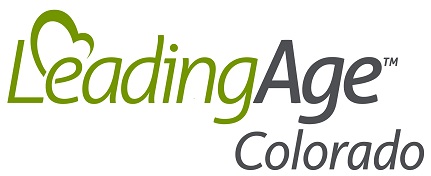
 Prev Month
Prev Month View Month
View Month Search
Search Go to Month
Go to Month Next Month
Next Month All repeats
All repeats 


